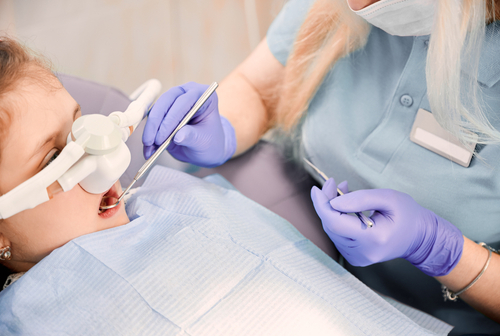Many people experience fear and anxiety when going to the dentist. Dental anxiety can make it difficult for someone to get the necessary dental care, which could result in oral health problems. Sedation dentistry offers a way to reduce these fears and eliminate the stress associated with dental visits. Medication is administered to patients during dental procedures during sedation dentistry. It is a secure and efficient option for those undergoing extensive treatments or those with dental anxiety.

Types of Sedation Dentistry:
One of the least intense sedatives in dentistry is nitrous oxide, also known as laughing gas. It is given through a mask placed over the patient’s nose, producing euphoria and relaxation. After the procedure, patients can resume their normal activities because the side effects subside quickly.
- Oral Sedation: This type of sedation entails taking a pill form of a prescribed drug before the dental appointment. Patients with moderate anxiety can benefit from oral sedation because it promotes a higher level of relaxation. Patients should arrange for someone to drive them home after the procedure because the effects might take some time to wear off.
- Intravenous (IV) Sedation: IV sedation induces a more profound state of relaxation by being injected directly into the bloodstream. It is frequently employed for more complex dental procedures or in patients with a great deal of dental anxiety. Vital signs are continuously tracked throughout the process to guarantee the patient’s security.
The Benefits of Sedation Dentistry:
- Reduces Dental Anxiety: Sedation dentistry’s main advantage is its capacity to calm nervous patients. It can make an uncomfortable and stress-free dental appointment possible, enabling people to receive dental care without feeling anxious.
- Pain and discomfort control: Sedation dentistry minimizes pain and discomfort during dental procedures while reducing anxiety. It enables patients to receive treatments without experiencing typical dental-related aches.
- Efficiency in terms of time: Patients who receive sedation may experience longer, more involved procedures as being much shorter. This is especially useful for people who want to have extensive dental work completed in a single visit but need extensive work done.
- Reduces Restlessness and Gag Reflex: Some patients may experience restlessness or a sensitive gag reflex while receiving dental treatment. These problems are lessened by sedation, which makes it simpler for the dentist to carry out the required procedures.
Is Sedation Dentistry Safe?
Consideration dentistry is generally safe when performed by qualified and skilled dental professionals. The dentist over at https://tampadentalhealth.com/ will carefully review the patient’s medical background before the procedure and any possible risks or contraindications. The patient’s vital signs are continuously checked throughout the sedation to ensure their safety throughout the dental procedure.
Who Can Benefit from Sedation Dentistry?
The following conditions are all excellent candidates for sedation dentistry:
- dental phobia or anxiety
- phobia of needles or dental tools
- vulnerable gag reflex-dislike of dental sounds and odors
- extensive dental work is required
- Patients with special needs or requiring multiple procedures during a single appointment can also benefit.
In conclusion, sedation dentistry has dramatically improved the dental experience for many patients by enabling them to receive the necessary treatment without anxiety or pain. Dentists can adapt their treatment plans to meet each patient’s unique needs, thanks to the various levels of sedation available. Sedation dentistry provides a way to easily overcome dental anxiety and maintain optimal oral health, whether through light relaxation with nitrous oxide or deep sedation through IV. Consider discussing sedation options with your dental professional if dental anxiety has been preventing you from seeing the dentist to start a more relaxed and satisfying dental journey.